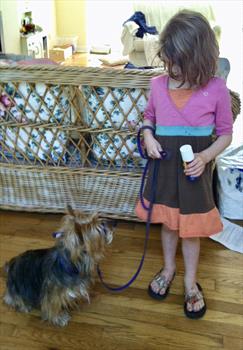Dog Training: Why to Use Rewards
Animals ranging from flatworms and dogs to dolphins and people can learn to perform different behaviors based upon consequences. Doing something either makes them feel good or feel bad. For example, a chimp learns to push a stick into a termite mound because when she pulls it out it is covered with termites to eat; a cat may learn to stay away from a stove because it hurt when he touched a hot burner.
Why Reward-Based Training?

With positive reinforcement — having something good happen when the animal does what you want — your dog can learn basic behaviors such as “sit,” “lie down,” “stay,” or even more complicated tricks, like rolling over, spinning or waving. You can train for a competition like agility or a job like search and rescue, or just for fun. With reward-based training, you can train both on-leash and off-leash.
Teaching your dog new things using rewards improves the dog’s mood, builds self-confidence, and opens a new path of communication strengthening the human-animal bond.
- Mood: When something good happens your mood improves. Reward-based training reduces anxiety by giving the dog an element of control in his life. Your dog learns exactly what he needs do to make good things happen.
- Self-confidence: Since reward-based training doesn’t involve force, like pushing a dog’s back end for a sit or tugging on a leash and collar to make her lie down, your dog has to figure out how to get rewards. As your dog learns more behaviors, even basic ones like “sit” or “stay,” she also learns how training works and learning new things becomes easier.
- Communication: Humans often use a lot of words to communicate. Dogs use body language. People often frustrate dogs or make them anxious because we can make it hard for dogs to learn what we expect of them. We may talk too much or use body language that doesn’t communicate the same message as our words. Giving cues (commands) and rewarding for desired behavior helps the dog understand that you both speak the same language. It helps the trainer learn to pay attention to the dog’s body language to see where the miscommunication may be.
- Human-animal bond: Training improves communication and with improved communication you end up with a happier and better-behaved dog. Isn’t that what we all want from our dogs: to be happy and easy to live with?
You may hear people say that reward-based training is “bribing the dog,” that reward-based trainers don’t know how to say, “No,” or set limits. Some people feel dogs should do things just to please people, not for rewards. Not true. Giving a dog a reward for doing something isn’t bribery, it’s payment for doing the “job” you asked him to do. The rewards are most often food, especially something extra delicious, but for some dogs the opportunity to play with a special toy can be highly motivating. Petting can be a reward for some dogs but it’s hard to use in when teaching new things because it can be very distracting.
Dogs think in the “here and now” so the dog needs to get his reward immediately. Their brains can’t understand waiting until the end of the week to get a paycheck. You may like being praised by your boss, but getting your paycheck is what motivates you to go to work every day. Same thing for your dog; he enjoys it when you praise him and talk nicely to him, but if he’s doing a difficult job, like sitting still on a walk when he sees another dog, he needs that paycheck! (See Dog Training Using Rewards: How To)
Why Not Use Punishments?
People may get frustrated when training isn’t going perfectly and start to look for quick fixes and often turn to punishment-based options. There’s a growing body of research showing us that dogs trained via positive reinforcement versus punishment-based training methods (especially using shock collars) are happier and less anxious during training, whether it’s learning new things or responding to cues they already know. Learning occurs more efficiently with reward-based training than other methods. Physically punishing an anxious or unsure animal can lead to aggression.
Training is a gift we give our dogs. It helps them know how to live by the rules that people set for them. Training with rewards makes sure that this gift isn’t a booby prize.
